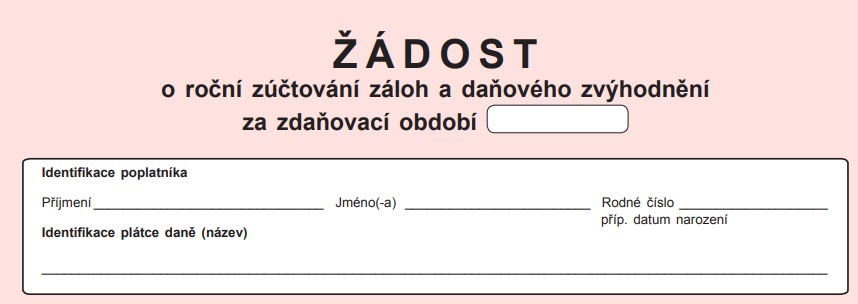The Annual Tax Reconciliation (“ATR” or “Roční zúčtování daně” in Czech) is a simplified reconciliation of payroll taxes withheld by the employer from the employee’s salary throughout the year. It happens only internally at the employer’s and no documents on behalf of the employee are filed with the tax office.

Who Is Eligible to the ATR?
The ATR for 2023 shall be made by the employer for an employee who:
- Signed a Declaration of the personal income taxpayer with the employer, “Prohlášení poplatníka daně z příjmů fyzických osob ze závislé činnosti” in Czech
- Is not obliged to file a personal income tax return
- Applies until 15 February 2024 for the ATR, signs “Žádost o roční zúčtování záloh a daňového zvýhodnění” in Czech (see picture above)

Who Is Obliged to File a Tax Return?
Employees are obliged to file their own personal income tax return especially when:
- They had employment income from multiple employers at the same time (and it was subject to advance tax, not final withholding tax), or
- They had other income higher than CZK 20,000 that is not exempt from tax or subject to the final withholding tax, e.g. self-employment, rental, some capital income or other income
Following the abolition of the solidarity tax and introduction of the progressive taxation, there is now no limit of employment income that would require the employee to file a tax return as there was in the past. For 2020 this was the amount of CZK 1,672,080.
In general everyone whose annual income exceeded CZK 50,000 should file a personal income tax return, but employees having only one employment income can generally apply for the ATR instead of filing a tax return on their own.
What Has To Be Enclosed to the ATR Application?
The employee should submit the following attachments to the application for the ATR:
- Confirmation of taxable income from all previous employers where he/she was employed in 2023, or information on his/her activities until joining his last employer, e.g. proof of registration at the labor office
- Documents proving entitlement to the relevant tax deductions or tax base deductions